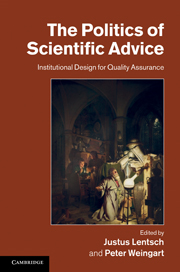Book contents
- Frontmatter
- Contents
- List of figures
- List of tables
- Acknowledgements
- Biographical notes
- Part I Methodological issues: quality control and assurance in scientific policy advice
- Part II Collegial science advisory bodies
- Part III Collegial science policy advisory bodies
- Part IV Research-based advisory organisations
- 10 The industrial organisation of economic policy preparation in the Netherlands
- 11 Quality control for the leading institutes of economic research in Germany: promoting quality within and competition between the institutes
- 12 Quality control and the link between science and regulation from a national and EU administrator's perspective
- 13 Science into policy: The European Environment Agency
- 14 Reflective approaches to uncertainty assessment and communication
- 15 Looking through the telescope – quality assurance in scientific advice to politics
- 16 Scientific policy advice and foreign policymaking – Stiftung Wissenschaft und Politik (SWP), the German Institute for International and Security Affairs
- Part V Academies of science
- Index
- References
15 - Looking through the telescope – quality assurance in scientific advice to politics
Published online by Cambridge University Press: 25 October 2011
- Frontmatter
- Contents
- List of figures
- List of tables
- Acknowledgements
- Biographical notes
- Part I Methodological issues: quality control and assurance in scientific policy advice
- Part II Collegial science advisory bodies
- Part III Collegial science policy advisory bodies
- Part IV Research-based advisory organisations
- 10 The industrial organisation of economic policy preparation in the Netherlands
- 11 Quality control for the leading institutes of economic research in Germany: promoting quality within and competition between the institutes
- 12 Quality control and the link between science and regulation from a national and EU administrator's perspective
- 13 Science into policy: The European Environment Agency
- 14 Reflective approaches to uncertainty assessment and communication
- 15 Looking through the telescope – quality assurance in scientific advice to politics
- 16 Scientific policy advice and foreign policymaking – Stiftung Wissenschaft und Politik (SWP), the German Institute for International and Security Affairs
- Part V Academies of science
- Index
- References
Summary
‘To support politics, where science serves the maintenance of power; to avoid disturbing the political environment, where this damages the maintenance of power.’ This was the answer given by Kurt Biedenkopf when asked what politics expects from science, and he meant it ‘not at all cynically’ (Biedenkopf 2006). With this, Biedenkopf, who was in his career not only a politician but also a scientist (law and economics) and scientific manager (including a period as high-school principal), aptly characterised the conflict of interests in which scientific advice to politics takes place.
Scientific advice to politics is a primary function of governmental research, but this is not its only function. Scientists from a wide range of fields are carrying out research in federal and state ministerial facilities to provide to their respective ministries new knowledge in their areas of expertise. Governmental research is, to the most part, applied and oriented towards developing measures, i.e. it is of a practical nature. Its findings are usually directed to providing a scientific basis for the advice given to politics. Many facilities are also trusted with sovereign duties including testing, authorisation, standardisation and risk assessment.
These responsibilities, which stem from the duty of the state to protect its citizens, are enshrined in various laws and regulations such as the Protection from Infection Law or the Equipment and Product Safety Act.
- Type
- Chapter
- Information
- The Politics of Scientific AdviceInstitutional Design for Quality Assurance, pp. 270 - 285Publisher: Cambridge University PressPrint publication year: 2011
References
- 1
- Cited by



